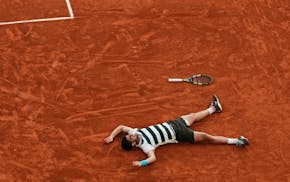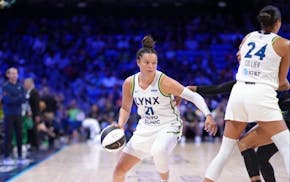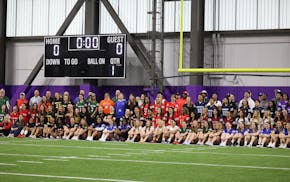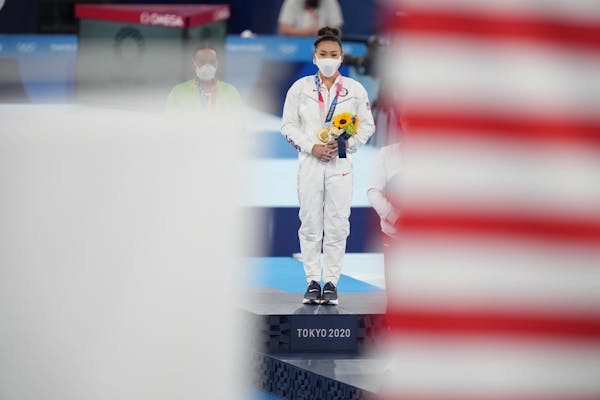Kaohly Vang Her could not contain her joy.
Suni Lee, who had competed in the same local gym with her daughters, had just won an Olympic gold medal. But that's not all Her thought as she watched the triumph on the world stage unfold from an Oakdale viewing party with more than 300 family members and fans.
She reflected on long struggles overcome.
"Her victory," she said with pride, "is all of our victory."
It was a moment like no other for the state's large, resilient Hmong American community, once refugees and newcomers to the frozen foreign land of Minnesota, now a part of its bedrock.
And a community that can count an Olympic champion, born and raised in St. Paul, as its own.
As the first Hmong American Olympian, gold medalist and the first Asian American to win the gymnastics all-around, Lee made history for a community that has often felt invisible.
"It's amazing that she's the first Hmong ever to make it this far. It's a huge thing for the community and for our families," Lee's mom, Yeev Thoj, said after the Olympics watch party in Oakdale early Thursday morning.
Lee's unexpected win touched hearts and sparked pride across Minnesota, home to more than 70,000 Hmong people — among the largest settlements in the United States. Gov. Tim Walz and St. Paul Mayor Melvin Carter declared Friday to be Sunisa Lee Day.
As a fellow Hmong woman, Her said Lee's victory is especially important. The St. Paul state representative recalled having to forge her parents' names to play sports as a child, an activity that some traditional Hmong families continue to disapprove of, Her said.
"In her victory she showed us that investment in our daughters matter, and what our daughters could achieve matters and that what our daughters can become is beyond what we could have ever imagined," Her said.
Nelsie Yang, the first Hmong American woman elected to the St. Paul City Council, called Lee's win "a dream come true."
"It really speaks to the potential we all have," Yang said. "It makes me think about our parents and grandparents. If they'd never made that journey [to the U.S.], I might still be living in Laos, working in a field. To our elders, this just shows them all of it is so worth it."
Gloria Wong was 7 years old when she and her family made the perilous journey from Laos to a refugee camp in Thailand. The St. Paul business owner said Lee's victory is filling thousands of families with joy — and affirmation that the dangers they faced continue to be worth it.
"I was telling my husband that [Gen.] Vang Pao would be so proud of her if he were alive," she said of the leader who worked to settle the Hmong in the U.S. "He wanted so much for us to succeed in America."
In Hmong culture, parents talk about their children becoming doctors or lawyers or politicians, said St. Paul City Council Member Dai Thao.
"You'd hardly ever hear a parent say, 'Go and be a gymnast,' " he said. "You will now."
Suni Lee's big sister Shyenne jumped and shrieked Thursday morning when she realized Suni would win a gold medal. She stood in a jubilant crowd of family, friends and fans who had gathered to watch the competition on a big screen at an Oakdale event center.
"I just have no words, I'm so proud of her. I'm so excited. Oh my god, I'm so emotional," Shyenne said.
It was difficult for Lee's family to watch from half a world away, unable to support Suni's gymnastics feat in person because of the COVID-19 pandemic, she said.
"I wish I could give her a big hug right now. I've been texting her all day today," Shyenne said, before screaming when she realized that Suni was calling her over FaceTime from Tokyo. She spun her phone around to capture the cheering crowd for her sister.
Minutes later, the crowd watched her stand atop the podium, gold medal around her neck.
Many embraced Suni's parents, Houa John Lee and Yeev Thoj, who were at the center of the Minnesota celebration.
John, whom Suni hoped to win a medal for, was emotional over his daughter's 13 years of hard work leading up to the moment.
"She did it," he said. "I expected her to medal but I never expected gold. Simone [Biles] gave the opportunity to get that gold, because Simone is her biggest fan, and Simone is her captain."
Both Suni's mom and dad said they find her beam routine the most nerve-racking to watch.
"I was just praying that she would stay on beam. I want to make sure that she doesn't get hurt. I get really nervous when Sunisa goes on beam or bar because I've seen her get hurt," Thoj said.
Thoj said she wasn't expecting such a large crowd to come out in support of her daughter, bringing breakfast foods and wearing red, white and blue.
"The community is great. Throughout her whole career, every year we do a fundraiser for her. The community is always right behind her. Without that, Sunisa wouldn't be here. They're so supportive of her," John said.
The crowd clapped and shouted whenever Lee appeared on-screen, calling out, "Go Suni!" There were a few good-natured cheers when Brazilian gymnast Rebeca Andrade made the tiniest mistake in her floor routine, solidifying Suni's gold.
When NBC spoke of the Hmong community's history in the United States, the largely Hmong crowd gathered in a break-of-dawn party in Oakdale cheered as they appeared live on global television, showing their community to the world.
Fan Nini Lee, no relation, came out in support of Suni sporting a Team USA Hello Kitty jacket she picked up at Target. A Hmong former gymnast herself, Nini Lee said she was so excited to see Suni on the global stage.
"She is representing the Hmong community, so it's really awesome to see that because if she can do it, I think it just goes to show our whole community can do it," Nini Lee said.
But Kou Thao, a City Council member in Tracy, Minn., said Hmong around the world have been following Suni on social media. Lee's victory stands out not just because she is Hmong, he said.
"It's that she represents the United States. That's what I am most proud of," he said. "I've never been more proud to be an American."
Zoë Jackson • 612-673-7112 • @zoemjack
James Walsh • 612-673-7428 • @stribjwalsh

Alcaraz produces another major comeback to win French Open final in five-set thriller against Sinner

Lynx overwhelm pesky Wings in the fourth quarter, improve to 9-0

Twins find fuel in back-to-back homers, defeat Blue Jays

Players to watch in Minnesota's girls flag football state tournament

